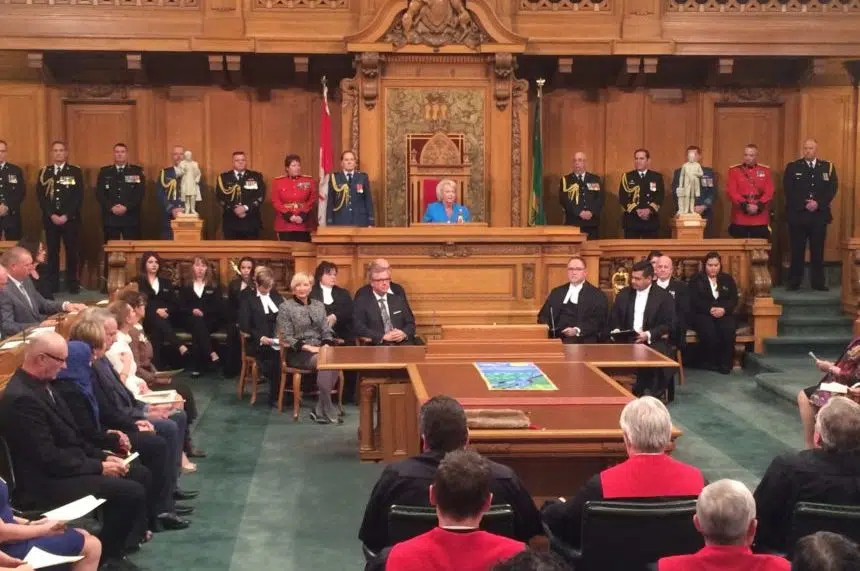Premier Brad Wall is taking on an ambitious agenda for his last session of provincial politics.
The Saskatchewan legislature opened Wednesday afternoon with the speech from the throne, written by Wall and delivered by Lt.-Gov. Vaughn Solomon Schofield.
In his final speech, the premier outlined the province’s intended actions on a wide variety of issues including ride-sourcing services, organ donation and marijuana legislation.
It also tackled tax changes for seniors, small business and corporations.
Wall stated the economy is expected to grow by 2.1 per cent this year — higher than originally forecast — while Sask. government debt is $400 million, lower than forecast at budget time.
Here’s what people in Saskatchewan can expect in the next year:
Tax changes for small business, seniors
Saskatchewan’s small business owners will get help from the province to lower their taxes.
Effective Jan. 1, 2018, the small business income threshold will be raised from $500,000 to $600,000, the highest in Canada.
The province is returning its corporate tax rate to 12 per cent – the same as other western provinces.
The government is also monitoring developments in the potash industry, particularly the merger of PotashCorp and Agrium into a new company called Nutrien.
Saskatchewan is looking ensure Nutrien’s continued head office presence in Saskatoon, and increased employment in the province as the merger moves forward.
Seniors will have the option of deferring the education portion of property tax on their home.
Saskatchewan will introduce the new Seniors Education Property Tax Deferral Program for those with household incomes under $70,000.
The speech from the throne also confirmed the repeal of Bill 40, which the Saskatchewan government introduced last year to allow the sale of Crown corporations up to 49 per cent.
Paving the road for Uber, Lyft
People could soon be hailing an Uber in Saskatchewan.
In response to the province leading the country on impaired driving rates, legislation will be introduced allowing SGI to offer affordable insurance to drivers working for ride sourcing companies.
“We will be urging municipalities to allow ride sharing services to operate within their jurisdiction,” Wall wrote.
“We will work with smaller communities to attract or establish a ride sourcing network so people have another option for a safe ride home.”
Over the last decade, more than 600 people have been killed, and more than 4,000 injured, in crashes involving drunk drivers in Saskatchewan.
Right to choose schools
Parents in Saskatchewan will maintain their right to choose which school their child attends.
In an April 21 decision, a judge ruled it was unconstitutional for the province to pay for non-Catholic students to attend Catholic schools.
On May 1, Wall said the government will introduce legislation to invoke the notwithstanding clause of the Charter of Rights and Freedoms. That has been confirmed to move forward this year.
The clause allows provinces to override sections of the Charter of Rights and freedoms for a limited time, which has the effect of nullifying any legal decision.
Organ donation changes
Potentially life-saving changes are coming to Saskatchewan’s organ donation process.
Changes to regulation will expand the pool of donors to allow for a donation after cardio-circulatory death, and by implementing a mandatory referral program.
The province is continuing to explore the option of moving to a model of presumed consent — which asks people to opt out, instead of opt in.
Saskatchewan’s rate of organ donations is low compared to the rest of Canada and many other countries.
Marijuana legislation
Wall has been critical of the federal government’s plans to move forward on legalizing non-medical use of marijuana by July 2018.
He was among the Canadian premiers this past July who took issue with the feasibility of the date, noting they needed more time to address safety, distribution, taxation and public education.
“Despite these concerns, the federal government has not changed its timetable,” Wall wrote. “Therefore, my government has no choice but to prepare for this historic revision to the Criminal Code.”
The province is currently in the midst of a review process that included an online public consultation with nearly 35,000 responses.
When the review is done this fall, the province will introduce legislation to govern the sale and distribution of marijuana, enhance public education and outline measures to protect public health and safety.
Privacy Act
Victims of cyberbullying — particularly through the unauthorized sharing of intimate images — will see greater protections in Saskatchewan.
Amendments to the provincial Privacy Act will see the creation of a reverse onus, requiring the defendant to prove the plaintiff consented to the release of the images in question.
The requirement that these cases be heard in Court of Queen’s Bench will also be removed, allowing victims to sue for compensation in a civil action.
“Once The Privacy Act is amended, the victims of ‘revenge porn’ or ‘sexting’ can seek redress through small claims court, which will be less costly for them,” Wall wrote.
New provincial park
The Saskatchewan government has committed to creating a new provincial park in the Porcupine Hills, southeast of Hudson Bay.
Since 2007, higher attendance at the 35 Saskatchewan provincial parks has helped boost total tourist visits from 8.46 million to 12.24 million — a 45 per cent increase.
Total visitor expenditures have grown by nearly 35 per cent to $2.15 billion a year.
Final speech from the throne
This is Brad Wall’s last speech from the throne as premier, having announced his retirement from politics in August.
While the speech lays out the government’s plans for the months ahead, not all of the details have been fleshed out. Wall contends he wanted it that way.
“I’m mindful that I am the outgoing leader, some decisions will rest with the new government that will be sworn in, in early February,” Wall told reporters.
Wall’s last day in the legislature is Dec. 7. He remains as premier until Jan. 27, 2018.











